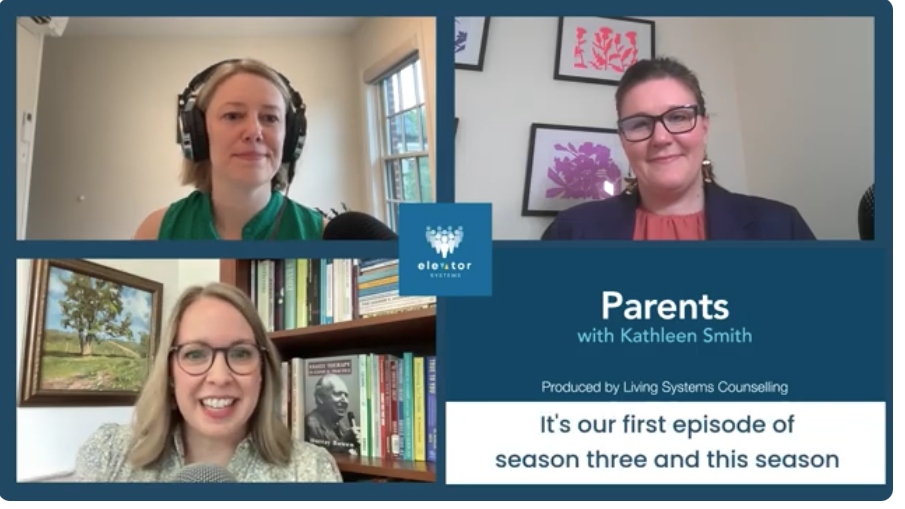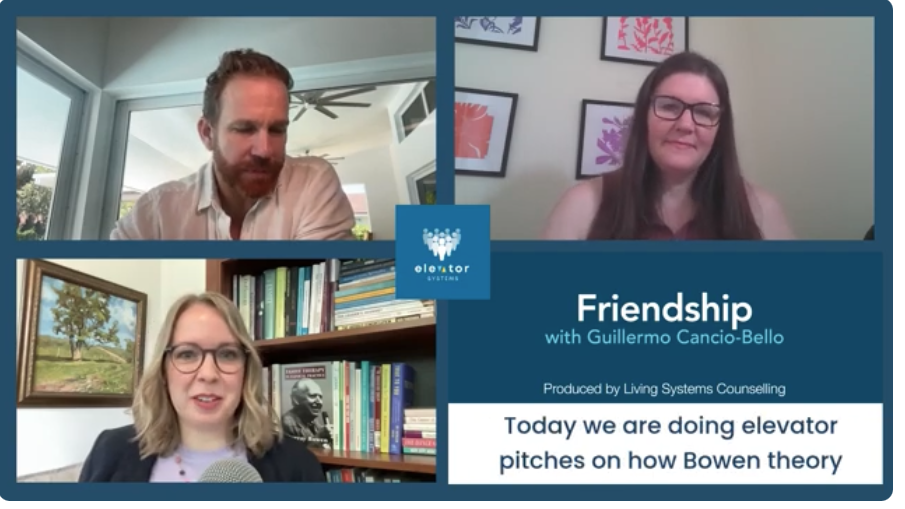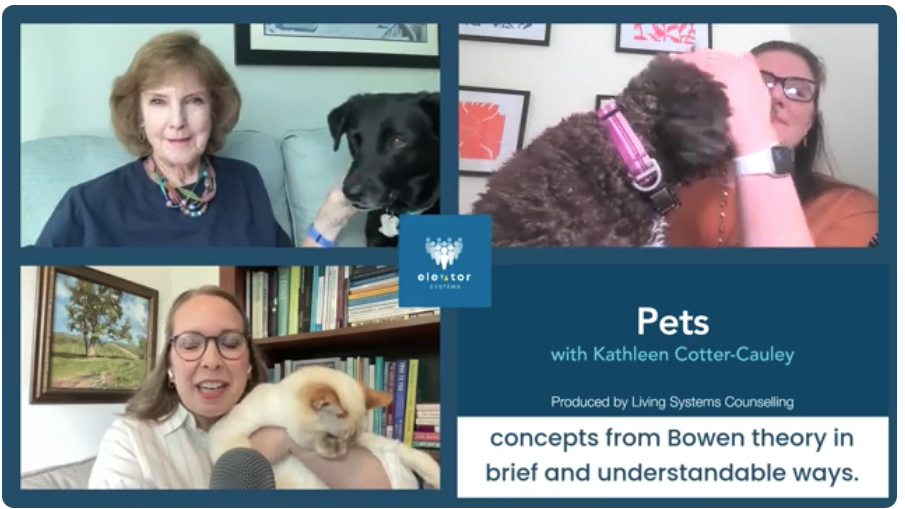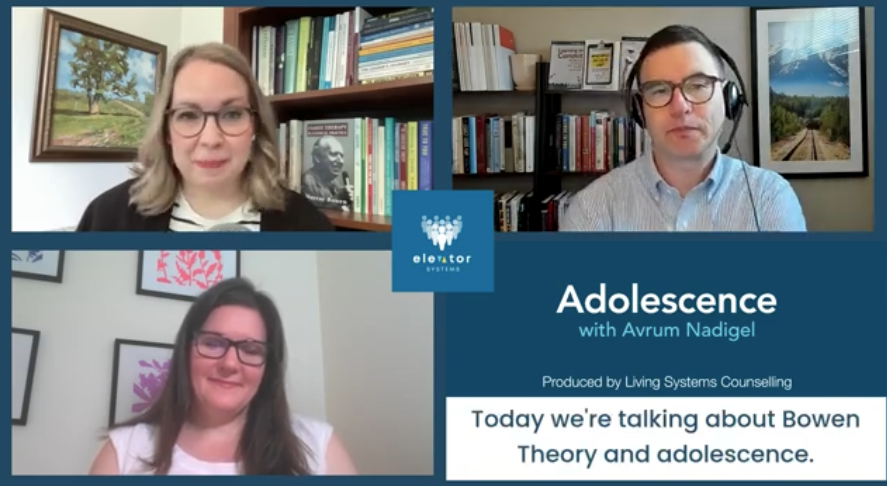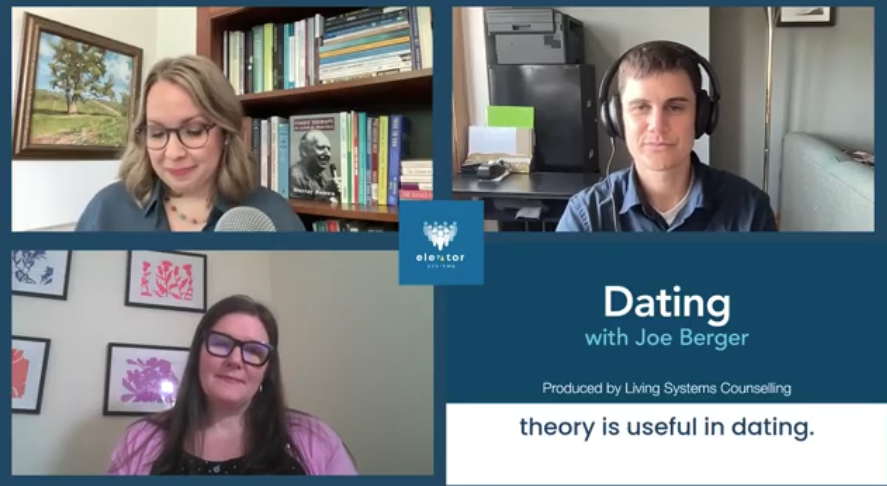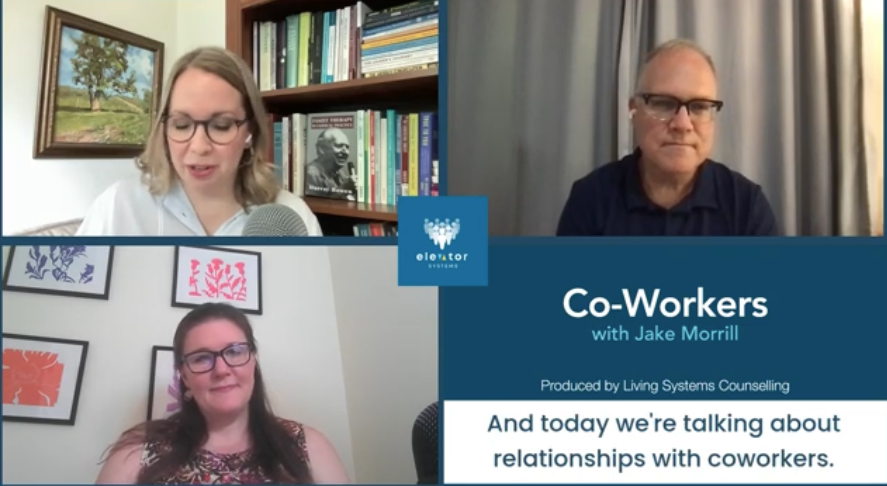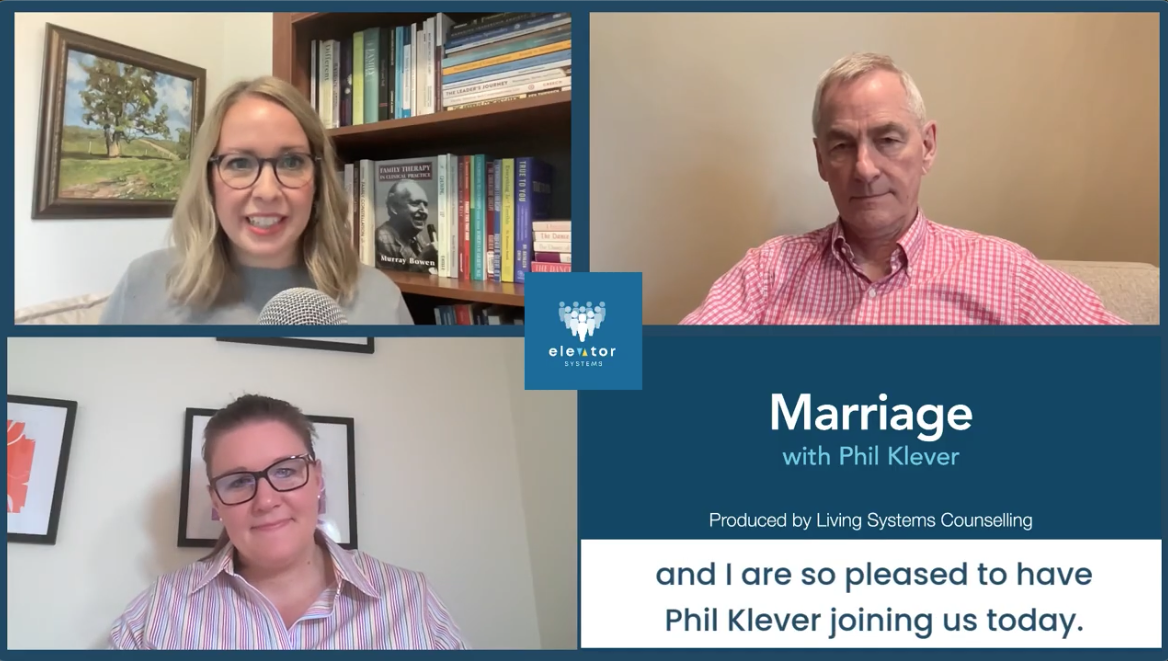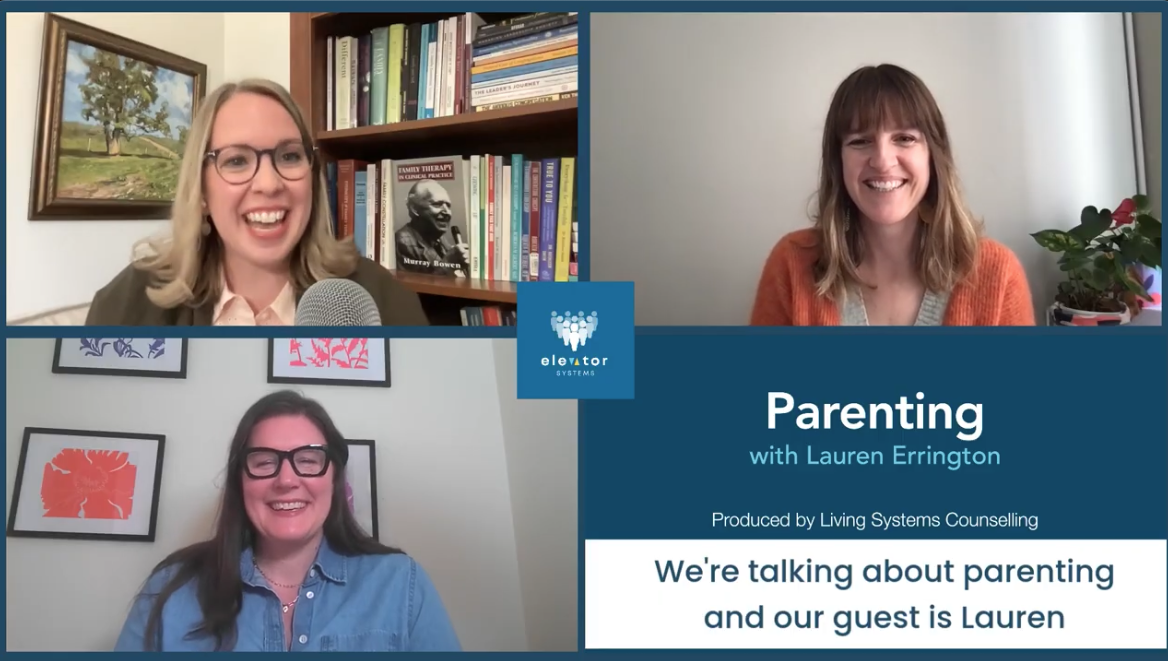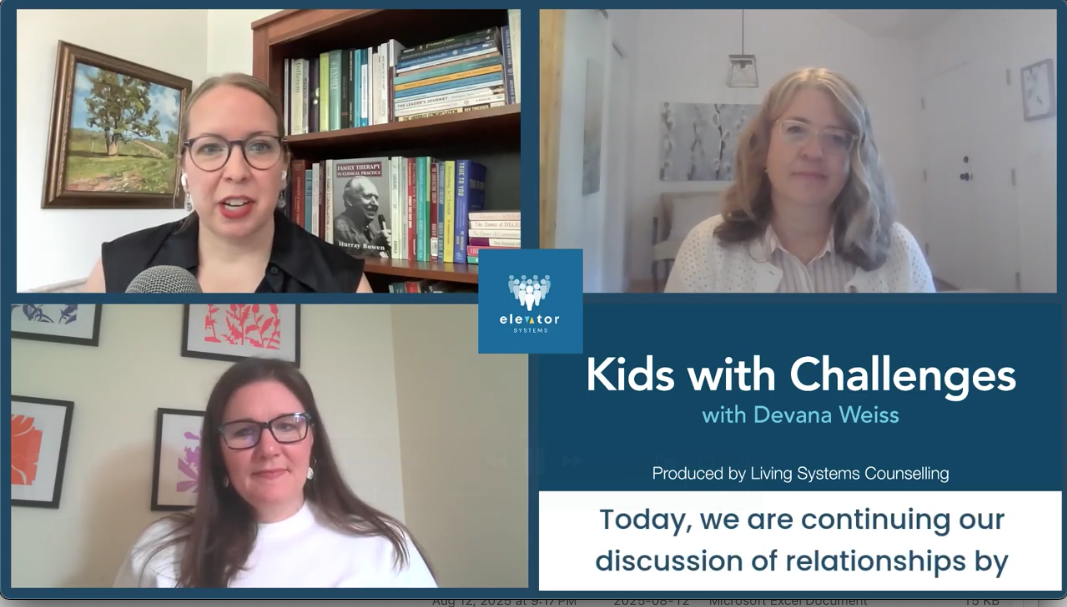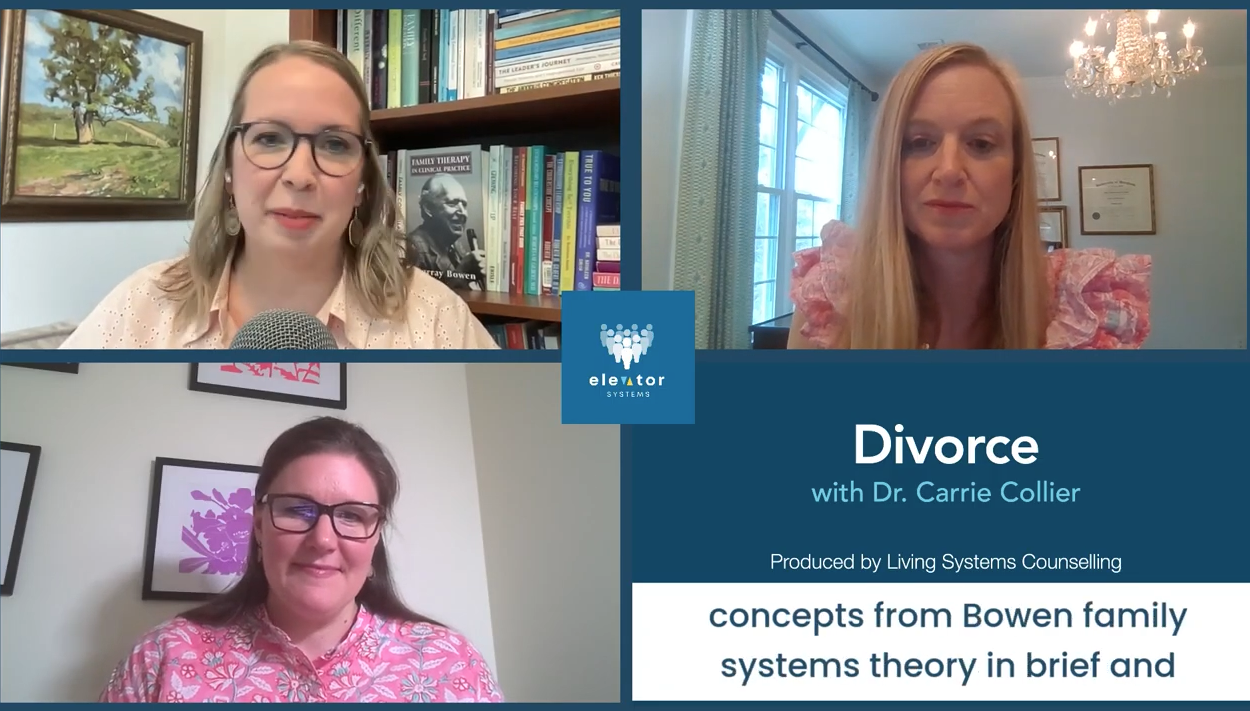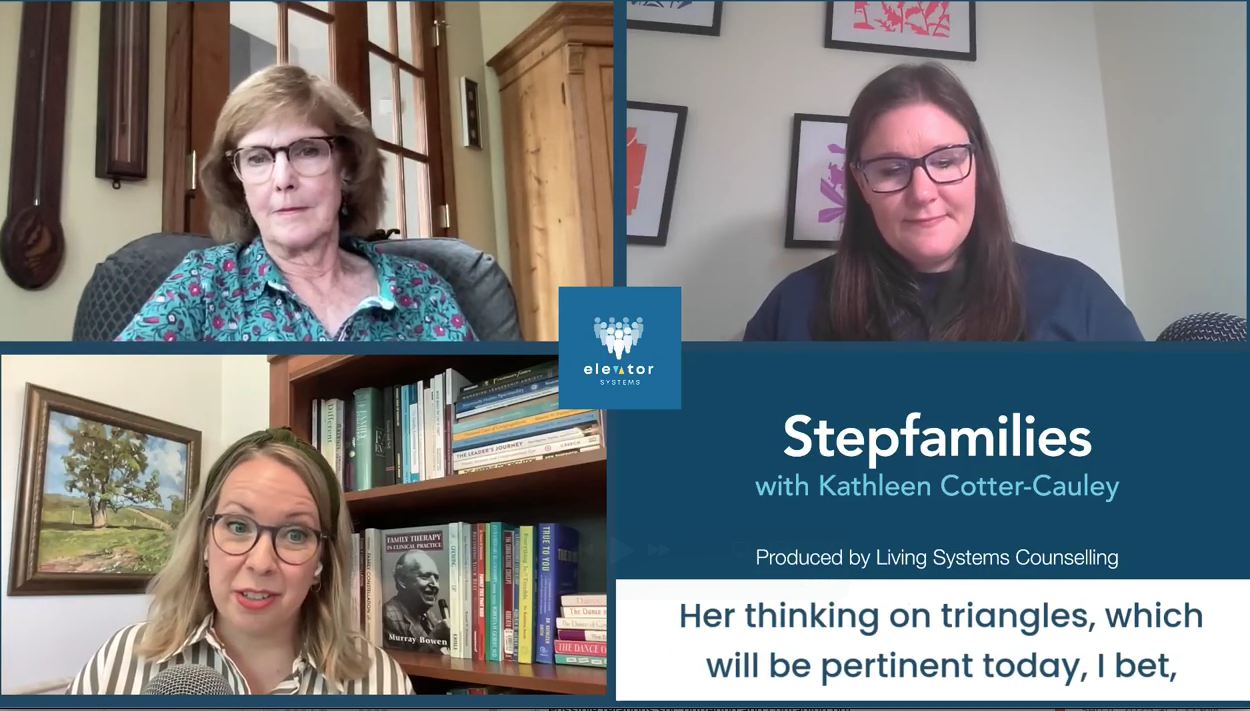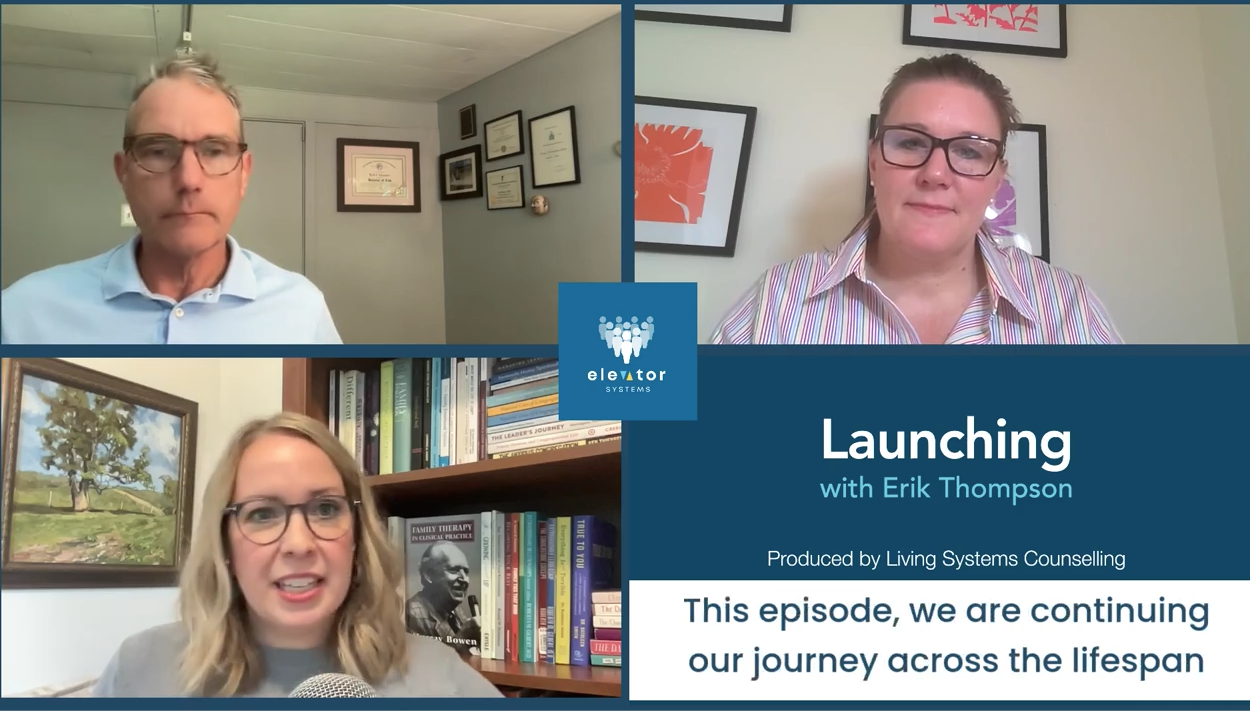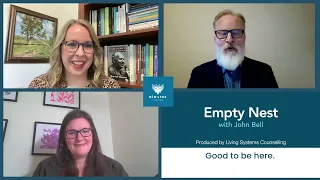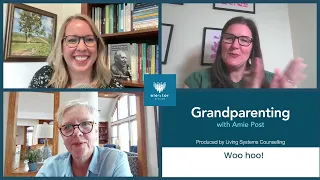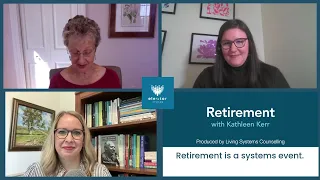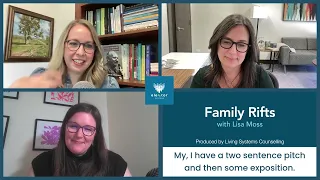
These Podcasts
are for everyone.
Elevator Systems is a podcast that explores Bowen family systems theory in clear and practical ways. The 30-minute episodes feature three Bowen-thinkers sharing their 30-second elevator pitch, real-life examples, useful insights, and resources for further exploration.
Whether you’re new to Bowen’s ideas or have decades of experience, this podcast offers engaging discussions that inspire curiosity and deepen your understanding of relationships.
New podcast episodes every Tuesday starting July 8, 2025!
Subscribe on YouTube, Spotify, or Apple Podcasts so you don’t miss a weekly release.
Like, Comment & Share to support systems thinking in everyday life.
Disclaimer: This podcast provides general information about Bowen family systems theory and is not intended as counseling or therapy. The views expressed are those of the speakers, and any use of the information is at your own risk.
Your podcast hosts

Dixie Vandersluys
Dixie Vandersluys is the creator and host of Elevator Systems and a Canadian Certified Counsellor. Based in Manitoba, Canada, she operates an online private practice while continuing her professional education, including three years of post-graduate training with Living Systems. Recently, Dixie joined the faculty of Living Systems Counselling and Training.

Katie White
Katie White is a couple and family therapist with over 20 years of clinical experience across the United States, Australia, and now Vancouver, Canada. For the past 12 years, she has incorporated Bowen Theory into both her professional practice and personal life. Katie serves as the Executive Director of Living Systems, where she also teaches, supervises trainees, and maintains a private practice working with individuals, couples, and families.
Season Three Episodes
Special Episode: What is a Relationship System? with Lois Walker and Ron Richardson
This special podcast episode was recorded live at the Living Systems Annual General Meeting in Vancouver, British Columbia, in May 2025. It addresses the question of what is a relationship system. Ther is a focus on what Bowen family systems theory describes as an “emotional system”. Each guest will give a brief elevator pitch of a relationship system, with examples, how it is useful to Bowen theory. There are also takeaway ideas, questions, and resources for further thinking.
Lois Walker started observing diversity among families as a young graduate nurse. She became interested in the spiritual needs of individuals and families in cancer care and palliative care. Lois later completed a Masters of Divinity and entered the training program in Bowen theory at North Shore Counselling Centre (now Living Systems) in 1990. Following that she completed three years of the post-graduate program at the Georgetown Family Center (now the Bowen Center for the Study of the Family). For 35 years, Lois has continued to study Bowen theory as well as teach and provide clinical supervision in the training program at Living Systems.
Dr. Ronald Richardson graduated from UCLA, Princeton Seminary, and the Rochester/Colgate Divinity School. He worked as a pastor before becoming a Marriage and Family Therapist and Pastoral Counsellor. He was the former Executive Director of Living Systems and retired in 1995. In addition, he was an American Association for Marriage and Family Therapy (AAMFT) Supervisor and a Diplomate for the American Association of Pastoral Counselors (AAPC). Ron is the author of many books on the application of Bowen family systems theory to organizations and relationships. Ron is now 85 and has been married to Lois Richardson for 58 years. Find Ron’s books by searching “Ronald W. Richardson” on Amazon.
Resources
Murray Bowen: Family Therapy in Clinical Practice
Michael E. Kerr & Murray Bowen: Family Evaluation
Michael E. Kerr: Bowen Theory’s Secrets
Anne S. McKnight: Thinking Systems
John F. Butler chapter in: The Family Emotional System (Noone & Papero)
Roberta Gilbert: The Eight Concepts of Bowen Theory
Roberta Gilbert: Extraordinary Relationships
Check out Amazon under “Ronald W. Richardson”
Preseason Episode: Bowen Theory & Relationships Across the Lifespan
Season 3: Preseason Episode
Welcome to Season 3 of Elevator Systems!
In this pre-season episode, hosts Dixie Vandersluys and Katie White introduce the theme for the new season: Bowen Family Systems Theory in Relationships Across the Lifespan.
This season, we’re taking Bowen Theory out and about—applying it to real-life relationships including:
-
- Childhood
- Friendships
- Pets
- Partnered relationships
- Coworkers
- Parenting
- Later-life relationships
We’re also joined by Elise Steenburgh from The Murray Bowen Archives Project, who shares how the archive’s resources will enrich the season.
Founded in 2008, The Murray Bowen Archives Project is dedicated to preserving, cataloging, and promoting access to the archival legacy of Dr. Murray Bowen. The organization ensures that Dr. Bowen’s clinical notes, video & audio recordings, photographs, correspondence, and other artifacts are safeguarded and made available for scholarly research and public education. These materials reflect Dr. Bowen’s development of a new theory of human behavior known as Bowen theory.
Explore: https://www.murraybowenarchives.org
Resources
- The Murray Bowen Archives Project
- Elevator Systems Seasons 1 & 2
- Growing Yourself Up by Jenny Brown
- The Family Life Cycle edited by Monica McGoldrick & Betty Carter
- Living Systems Fall Conference: Aging—Individual Challenge or Family Opportunity?
Parents
with Kathleen Smith
Season 3: Episode 1
Welcome to Season 3 of Elevator Systems!
In our first episode of the season, we’re diving into our earliest relationship with parents/ caregivers — a formative relationship that shapes us across the lifespan.
Joining hosts Dixie Vandersluys & Katie White is licensed therapist and author Dr. Kathleen Smith. Kathleen’s books include Everything Isn’t Terrible and True to You: A Therapist’s Guide to Stop Pleasing Others and Start Being Yourself. Living in Washington, DC, Kathleen is a faculty member at the Bowen Center for the Study of the Family and author of the popular newsletter, The Anxious Overachiever.
What You’ll Learn in This Episode:
- How our relationship with parents is “Olympic training for objectivity”
- How Bowen family systems theory broadens perspective to multigenerational patterns
- What happens when we see our parents as humans, not heroes or villains
- The role of blame, anxiety, and differentiation in adult relationships
- Why cut-off isn’t always the end and the usefulness of curiosity
- Real-world examples: parenting, loss, tooth hygiene, and “Sweet Caroline”
Whether you’re navigating family dynamics, interested in personal growth, or work in mental health, this episode has insights, humour, and practical tools to think differently about you and your family story.
Resources
- The Murray Bowen Archives Project
- Elevator Systems Seasons 1 & 2
- The Anxious Overachiever newsletter:
- Everything Isn’t Terrible by Dr. Kathleen Smith
- True to You by Dr. Kathleen Smith
- Family Therapy in Clinical Practice by Dr. Murray Bowen
Family Ties that Bind by Dr. Ron Richardson - Growing Yourself Up by Dr. Jenny Brown
Friendship
with Dr. Guillermo Cancio-Bello
Season 3: Episode 2
Welcome to Elevator Systems! In Season 3 Episode 2 hosts Dixie Vandersluys and Katie White are joined by special guest Dr. Guillermo Cancio-Bello to talk about the many aspects and facets of friendship from a Bowen family systems perspective.
Dr. Guillermo Cancio-Bello is an Assistant Professor of Counselling at Barry University and integrates Bowen theory into his clinical, academic, research, and organizational work. His teaching and scholarship focus on systems thinking, leadership development, and the personal and professional growth of counsellors-in-training. Guillermo currently serves as President of the Florida Association of Marriage and Family Counselling (FAMFC) and is also a board member of the Florida Family Research Network, which works to advance the science of human behaviour based on the natural systems theory of the family developed by Murray Bowen.
What You’ll Learn in This Episode:
- Differentiation (staying connected and separate) in friendship
- The role of sibling position in friend selection
- Fusion, triangles, and anxiety
- How family of origin impacts adult relationships
- Bowen theory insights on digital vs. in-person connections
- Examples from the biblical friendship of David & Jonathan to sending memes!
For counsellors or anyone interested in understanding relationships better, this discussion will get you curious about how you show up in your friendships.
Resources
- The Murray Bowen Archives Project
- Elevator Systems Seasons 1 & 2
- The Relationships We Live In podcast: https://rss.com/podcasts/episode-1-the-relationships-we-live-in/
- The Anxious Overachiever newsletter
- Dr Ronald Richardson: Jane Austen’s Guide to Good Relationships
- Dr Kathleen Smith: Everything Isn’t Terrible
- Dr Roberta Gilbert: Extraordinary Relationships
- Dr. Robin Dunbar’s loneliness research
Pets!
with Kathleen Cotter Cauley
Season 3: Episode 3
Welcome to Elevator Systems! In Season 3 Episode 3 Kathleen Cotter Cauley joins Dixie
Vandersluys and Katie White on the elevator to look at the role of pets in relationships — from cats and dogs to triangles and anxiety!
Kathleen Cotter Cauley is a licensed marriage and family therapist and has a private practice
in both Virginia and Florida. She’s a faculty member of the Bowen Center and was involved in founding the Florida Family Research Network. She has worked with guide dogs for over 30 years.
What You’ll Learn in This Episode:
- Viewing pets as active participants in the emotional field
- How animals reflect family anxiety and calm
- The concept of reciprocity in human-animal relationships
- The four patterns of reactivity (conflict, distance, projection, triangles) observed in pets
- How pet entries and exits impact family dynamics
- Examples from guide dogs, breeders, and meet our own pets!
Whether you’re new to Bowen Theory or a long-time learner, this episode offers surprising, insightful ways to observe functioning through your pets, watch anxiety move, and deepen your understanding of family systems.
Resources
- The Murray Bowen Archives Project
- Elevator Systems Seasons 1 & 2
Alan Entin: Pets in the Family - Dr. Murray Bowen: Family Therapy in Clinical Practice
- Dr. Michael Kerr: “Family Systems Theory and Therapy” in A. Gurman & D. Kniskern (Eds.), Handbook of family therapy.
Adolescence
with Avrum Nadigel
Season 3: Episode 4
Welcome to Elevator Systems! In this episode, we delve into the complexities of adolescence through the lens of Bowen family systems theory. Join hosts Dixie Vandersluys and Katie White with guest Avrum Nadigel as they explore how understanding family dynamics can illuminate the challenges and opportunities of the teenage years.
Avrum Nadigel has been a marriage and family therapist for 25 years and has completed postgraduate training in Bowen family systems theory. He is the author of three books: “Learning to Commit”, “It Takes More than Love” and “Where Would you Like to Start: A Master Therapist on Beginning Psychotherapy with Families”. Avrum has co-produced two podcasts: “Pop Parenting” and “The Love Examined Playlist”.
What You’ll Learn in This Episode:
- Bowen family systems theory’s unique perspective on adolescence: thinking about a teenager within the broader context of the family
- How multigenerational processes and family history impact adolescent behaviour and development
- The concept of differentiation and how teens strive to form their own identities while balancing family expectations and outside influence
- The significant role parents play in their adolescent’s development
- Practical advice for supporting growth, individuality and connection for the family
- Examples include: every John Hughes movie, music, sports, peer pressure, and summer camp
This episode is for professionals, parents, teens and anyone navigating this pivotal stage of life. Tune in to discover how systems thinking is useful in adolescence.
Resources
- The Murray Bowen Archives Project
- Elevator Systems Seasons 1 & 2
- Family Matters: Surviving the Teen Years
- Avrum Nadigel: Learning to Commit
- Avrum Nadigel: It Takes More than Love
- Avrum Nadigel: Where Would you Like to Start: A Master Therapist on Beginning Psychotherapy with Families
- Dr. Ron Richardson: Family Ties that Bind
- Dr. Daniel J. Siegel: Brainstorm
- Dr. Kathleen Smith: True to You
Dating
with Joe Berger
Season 3: Episode 5
Welcome to Elevator Systems! Therapist Joe Berger joins Dixie Vandersluys and Katie White to think about how Bowen family systems theory is useful in the dating world.
Joe Berger is a therapist who works with individuals, couples, and families and previously worked for several years in community mental health. He received a Masters in Social Work from the University of Vermont in 2012, and has completed two years of postgraduate training at the Bowen Center in Washington. He is currently a faculty member at the Vermont Center for Family Studies.
What You’ll Learn in This Episode:
- A Bowen theory approach to dating emphasizes focusing on oneself rather than the other person
- Being clear about one’s goals and guidelines in dating helps maintain authenticity and self-awareness
- The influence of societal and familial expectations on dating behaviour and relationship choices
- Keeping a sense of fun and curiosity is important in the dating process, alongside serious considerations
- Examples shared from personal experience, clinical cases, and the entertainment world
Counsellors, parents, and anyone navigating the dating world will find useful ideas for further thinking in this episode.
Resources
- The Murray Bowen Archives Project
- Elevator Systems Seasons 1 & 2
- Dr. Jenny Brown: Growing Yourself Up
- Dr Ronald Richardson: Jane Austen’s Guide to Good Relationships
- Dr Kathleen Smith: Everything Isn’t Terrible
- Avrum Nadigel: Learning to Commit
- Avrum Nadigel: It Takes More than Love
- Esther Perel: Mating in Captivity
Co-Workers
with Jake Morrill
Season 3: Episode 6
Welcome to Elevator Systems! Today we are riding the elevator at our places of work. Jake Morrill joins hosts Dixie Vandersluys and Katie White to look at the many ways a Bowen family systems lens can be useful in the everyday, big and small situations and challenges of work life.
Jake Morrill is the founder of Generation to Generation Leadership Coaching, which works with family businesses, congregations, and nonprofits. A longtime student of Bowen Theory, he’s on the faculty of the Bowen Center for the Study of the Family, where he’s one of the teachers of the course, “Differentiation at Work.”
What You’ll Learn in This Episode:
- Differentiation of self at work and the usefulness of a “this is me, who are you?” posture
- Over and under-functioning and finding balance in your role in work dynamics
- Professionalism vs. pseudo self and leading with personal integrity in the midst of external pressures
- The importance of one-to-one communication and open, curious conversations
- Defining work roles while considering personal values and family commitments
- Real life examples from middle management, consulting in challenging situations, and finding a work/life balance
For anyone at any level in the work world. This episode will offer insight into how work systems function and how to manage you!
Resources
- The Murray Bowen Archives Project
- Elevator Systems Seasons 1 & 2
- Dr. Murray Bowen: Family Therapy in Clinical Practice
- Jake Morrill: The Boundaries Workbook
- Leslie Ann Fox & Katherine Gratwick-Baker: Leading a Business in Anxious Times
- Kathleen Smith: Everything Isn’t Terrible
- The Anxious Achiever podcast: How Family Dynamics Play Out at Work
- The Anxious Achiever podcast: Is People Pleasing Hurting Your Career?
- Understanding Organizations: Ruth Riley Sagar and Kathleen Klaus Wiseman, Ed.
Marriage
with Phil Klever
Season 3: Episode 7
Welcome to Elevator Systems! This episode looks at Bowen family systems theory and marriage. Joining Dixie Vandersluys and Katie White is Phil Klever, who has spent over two decades doing research on married couples.
Phil Klever has applied Bowen theory in his clinical practice and his personal life for most of his adult life. He has tested Bowen theory hypotheses in his 20-plus year longitudinal family research study. He is a member of Dr. Daniel Papero’s postgraduate research seminar, the Bowen theory Journal Club, and the Bowen Centre’s Research Committee.
What You’ll Learn in This Episode:
- Observing fusion in marriage and the balance of being both a separate and connected person is central in maintaining maturity in marriage
- The influence of the multi-generational family on marriage
- Thinking through relationship patterns like conflict, distance, triangles, and over and under-functioning.
- Keeping a broad perspective about what is occurring in a marriage.
- Examples include: the classic approach/avoid pattern, a personal example of meeting the in-laws, “The Office” and “The Story of Us”.
Couples and counsellors alike will gain insights to how Bowen theory can inform one’s understanding of the marriage relationship.
Resources
- The Murray Bowen Archives Project
- Elevator Systems Seasons 1 & 2
- Dr. Ronald Richardson: Family Ties that Bind
- Dr. Jenny Brown: Growing Yourself Up
- Peg Donley interview
- Donley, M (2016) “Bonding and Babies: The Evolution of Biparental Care and The Primary Triangle”, Family Systems, 12,1.
- Phil Klever Research:
Chapters:
- 1998. “Marital Fusion and Differentiation.” In Titelman (Ed.) Clinical Applications of Bowen Family Systems Theory
- 2003. “Marital Functioning and Multigenerational Fusion and Cutoff.” In Titelman (Ed.), Emotional Cutoff
- 2008. “Triangles in Marriage.” In Titelman (Ed.), Triangles: Bowen Family Systems Theory Perspectives
- 2014. “Applying Differentiation of Self in One’s Family.” In Titelman (Ed.), Differentiation of Self
- 2020. “The Primary Triangle and Variation in Family Functioning.” In Keller and Noone (Ed.), Handbook of Bowen Family Systems Theory and Research Methods
- 2020. “The Multigenerational Transmission of Family Unit Functioning.” In Keller and Noone (Ed.), Handbook of Bowen Family Systems Theory and Research Methods
Articles:
- 2018. “Goal Effectiveness and Family Functioning.” The American Journal of Family Therapy 46: 195-212
- 2021. “Divergent Spouse Functioning.” Family Systems 14: 103-130.
- 2023. “Similarity in Spouse Functioning.” Family Systems 17.2: 139-165
- 2025. “Child Focus and the Family Unit: A Comparison of Families with Lower and Higher Child Symptomology.” Family Systems 19, 2: 105-133.
Parenting
with Lauren Errington
Season 3: Episode 8
Welcome to Elevator Systems! Today, Lauren Errington joins hosts Dixie Vandersluys and Katie White as we think about parenting from a Bowen family systems perspective.
Lauren Errington is the Executive Director of the Family Systems Institute in Sydney, Australia. She is also a Mental Health Social Worker and Clinical Family Therapist and Supervisor at the Family Systems Practice. She has written articles on the application of Bowen of theory in family therapy for multiple journals, including co-authoring a soon to be published article for the Journal of Marital and Family Therapy. Lauren is married and a parent of three school-aged children.
What You’ll Learn in This Episode:
- A parent’s effort to manage their own reactivity and provide kids developmental space
- Differentiation of self, balancing individuality and togetherness, in parenting
- Getting clear on one’s own parenting beliefs and values amid the many perspectives and pressures in parenting today
- How viewing the family as a system can help parents manage challenges by understanding multi-generational patterns
- The importance of humour and flexibility for parents to step back and see situations from a different perspective
- Examples: the humorous side of emotion coaching, the movie Parenthood, parenting in other species, and thinking through “taking off the training wheels” at different stages
This episode is for parents, anyone who works with parents, and anyone who has parents!
Resources
- The Murray Bowen Archives Project
- Elevator Systems Seasons 1 & 2
- Parent Hope Project podcast and resources
- Dr Jenny Brown: Confident Parenting
- Roberta Gilbert: Extraordinary Relationships
- Australian and New Zealand Journal of Family Therapy (Vol 45, Issue 2), Special Issue: Bowen Family Systems Theory
- White, Errington and Ruggier, “Promoting Parent Agency Across the World through the Parent Hope Project: The Difference Bowen Family Systems Theory Makes”, Journal of Marital and Family Therapy – in revision.
Kids with Challenges
with Devana Weiss
Season 3: Episode 9
Welcome to Elevator Systems! In this episode, we are looking at a Bowen family systems theory perspective on relationships with kids with challenges. Joining hosts Dixie Vandersluys and Katie White is fellow Living Systems colleague Devana Weiss, who brings personal and professional experience to this topic.
Devana Weiss is a licensed counsellor in private practise, a clinical supervisor, and a faculty member with Living Systems. She has been studying and practicing Bowen family systems theory for almost 20 years. She is married and a mother to three children, one of whom has developmental disabilities. She has lived experience navigating the medical and school systems and enjoys assisting parents and caregivers who face similar challenges.
What You’ll Learn in This Episode:
- The impact that worry has on a child with challenges and their relationships
- The importance of recognizing what is within one’s control as a parent and responding with steadiness, clear thinking and guiding principles during tough times
- The pattern of over and under-functioning and how Bowen theory is useful for assessing facts and needs and what kind of help is helpful
- The role of siblings and the entire family system in managing challenges
- Examples include: an analogy from a garden, the movie CODA, dinner time struggles, and how parents and professionals can manage their own anxiety
For any professional, family member, or friend in a relationship with a child with a challenge, this episode offers a unique perspective on what it means to be a resource.
Resources
- The Murray Bowen Archives Project
- Elevator Systems Seasons 1 & 2
- Catherine M. Rakow: Making Sense of Human Life
- Dr. Michael E. Kerr: Bowen Theory’s Secrets (epilogue chapter)
- Parent Hope Project specific episodes:
Divorce
with Carrie Collier
Season 3: Episode 10
Welcome to Elevator Systems! Today’s episode discusses divorce from a Bowen family systems theory perspective. Dr. Carrie Collier is back thinking alongside hosts Dixie Vandersluys and Katie White.
Dr. Carrie Collier is a researcher, lecturer and family therapist specializing in Bowen family systems theory. She earned her PhD in Counsellor Education and has over 25 years of study and practice as a Licensed Professional Counsellor. She is on the faculty of The Bowen Center where she serves on the Board of Directors and was Director for two years. She published and validated a Family Unit Functioning Questionnaire used by therapists and researchers to gather information about families. Her most recent research on the language of nature in Murray Bowen’s archival papers can be found in The Australian and New Zealand Journal of Family Therapy.
What You’ll Learn in This Episode:
- The usefulness of knowing family history and family patterns of functioning in marriage and divorce and how divorce can intensify patterns.
- Understanding one’s role in the family and how divorce can be an opportunity for personal growth and redefining relationships within the family system.
- How the intensity of emotional fusion in a marriage can mirror the intensity of separation during divorce.
- The resource of a coach or therapist for individuals to think through their functioning in the family.
- Family leaders who maintain open communication, clear thinking and connections with both parties in a divorce can positively influence the broader family system.
This episode is recommended for people and professionals who are navigating divorce.
Resources
- The Murray Bowen Archives Project
- Elevator Systems Seasons 1 & 2.
- Dr. Murray Bowen: Family Therapy in Clinical Practice
- Monica McGoldrick & Betty Carter: The Family Life Cycle
- Roberta Gilbert: Extraordinary Relationships
- Edward Beal: “Child-Focused Divorce” in Clinical Applications of Bowen Family Systems Theory (Ed. Peter Titelman)
- Family Matters: Divorce and Adult Children
- Dr. Carrie Collier: The Language of Nature in Murray Bowen’s Writings
Step Families
with Kathleen Cotter Cauley
Season 3: Episode 11
Welcome to Elevator Systems! This episode explores all the complexities of when families combine in stepfamily relationships and how Bowen family systems theory can be a resource. Kathleen Cotter Cauley is back on the elevator, sharing her thoughts and experiences with Dixie Vandersluys and Katie White.
Kathleen Cotter Cauley is a licensed marriage and family therapist and has a private practice in both Virginia and Florida. She’s a faculty member of the Bowen Centre and was involved in founding the Florida Family Research Network. Her thinking on triangles has been published in the book “Triangles: Bowen Family Systems Perspectives” by Peter Titelman. Kathleen has been married for almost 40 years, is a stepmom, a stepdaughter, and a grandma.
What You’ll Learn in This Episode:
- Stepfamilies provide a unique opportunity to apply Bowen family systems theory to complex dynamics
- Managing anxiety and working on self-differentiation are important in navigating stepfamily challenges
- Understanding the roles and expectations for each member of a stepfamily can help in managing transition and integration processes
- The importance of curiosity about each family member’s perspective and experienceThe useful framework of the family diagram and family history
- Examples include: personal experience and Hollywood examples including the movie “Stepmom”, the classic “wicked stepmother”, and “The Brady Bunch”
For anyone who is connected to a blended family. This episode offers a unique perspective and framework to think through and manage the complex dynamics of stepfamily life.
Resources
- The Murray Bowen Archives Project
- Elevator Systems Seasons 1 & 2
- Monica McGoldrick & Betty Carter: The Family Life Cycle
- Roberta Gilbert, “On Stepparenting” Family Systems Forum, Winter 2009, Vol 10 No4
- Dr. Daniel Papero: Developing A Systems Model for Family Assessment
- Kathleen Smith: The Cycle of Overfunctioning and Distance
- Family Matters: Navigating the Blended Family Maze
- Peter Titelman, Ed: Triangles: Bowen Family Systems Theory Perspectives
Launching
with Erik Thompson
Season 3: Episode 12
Welcome to Elevator Systems! Today’s episode looks at how Bowen family systems theory is useful in thinking about the launching stage in a family. Erik Thompson joins hosts Dixie Vandersluys and Katie White for a lively and informative discussion.
Erik Thompson is a licensed leadership psychologist with three decades of experience helping families. He founded Thompson Leadership Development and is the Executive Director of the Vermont Center for Family Studies. He created a 6 episode podcast, “To Honour and Cherish”, designed to support couples in achieving a sparky and sustainable relationship. He also has an interview podcast called “LeaderSight” which captures the wisdom of some of Erik’s favourite founders and executives. Erik lives in Vermont with his wife, and together they have launched four daughters.
What You’ll Learn in This Episode:
- The importance of preparing for the launching phase of children throughout life and thinking through parenting mindsets early on
- Explore the concepts of over-functioning and under-functioning in relationships and how over-helping may not be helpful
- The influence of culture on the specifics of the launching process and the variation that exists around norms and expectations
- Keeping in mind the balance between connection and independence when children leave home
- Examples include: personal stories of our families’ launches, summer camp, animal behaviour, and cultural variation
This episode is useful for parents at any stage, as well as professionals looking to support a family’s launching journey.
Resources
- The Murray Bowen Archives Project
- Elevator Systems Seasons 1 & 2.
- Dr. Jenny Brown: Growing Yourself Up
- Monica McGoldrick & Betty Carter: The Family Life Cycle
- Dr. Daniel Papero: Developing A Systems Model for Family Assessment
- Vermont Center for Family Studies
- To Honor & Cherish: A Marriage Podcast
- LeaderSight Podcas
Empty Nest
with John Bell
Season 3: Episode 13
Welcome to Elevator Systems! This episode will explore the empty nest stage from a Bowen family systems theory perspective. Joining Dixie Vandersluys and Katie White today is John Bell.
John Bell is an ordained United Methodist pastor who became interested in Bowen theory after hearing Peter Steinke say, “Good leadership rises about the anxiety of the group.” He has spent the last 30 years putting these theoretical words to practice in congregational, family, and civic life. In addition to training and mentoring clergy, John works with non-profit leaders and organizations who have an interest in sustainable and adaptive practices. John and his wife Alison work and live near Chicago and have three grown children.
What You’ll Learn in This Episode:
- The balance of dependency and independence in relationship, and the usefulness of parents working on maintaining a supportive yet independent relationship with adult
children. - How other family changes can influence functioning in the empty nest phase, such as divorce, remarriage, grandchildren, retirement and aging of parents.
- The transition to an empty nest can reveal the roles children played in the marriage and allows for a reevaluation of relationships.
- The importance of open communication and curiosity about each other’s goals and aspirations.
- Examples include: analogy of a plate spinning routine, the family cellular plan, and variation among families navigating changes and independence.
This episode is useful for families going through the empty nest stage or professionals wanting to think more systemically about this time of life.
Resources
- The Murray Bowen Archives Project
-
Dr. Jenny Brown: Growing Yourself Up
-
Monica McGoldrick & Betty Carter: The Family Life Cycle
-
Kathleen Smith, “Where’s All Your Energy Going?”
-
Living Systems Conference: Aging – Individual Challenge or Family Opportunity
Grandparenting
with Amin Post
Season 3 Episode 14
Welcome to Elevator Systems! Today Amie Post joins Dixie Vandersluys and Katie White to talk about grandparenting from a Bowen family systems theory lens. Amie is the keynote speaker at Living Systems’ conference, Aging: Individual Challenge or Family Opportunity on October 17th and 18th. Details below.
Amie Post, is a marriage and family therapist with extensive experience in leadership. She serves as the Executive Director of the Center for Family Systems Theory of Western New York and previously held the role of Executive Director at the Family Crisis Center of Baltimore County. A dedicated student of Bowen Theory since 2001, Amie is a faculty member and board director at the Bowen Center in Washington, DC. She is also a wife, mother, and grandmother.
What You’ll Learn in This Episode:
- The basic invitation of growing yourself up and being thoughtful about how to participate in family relationships with intentionality.
- The significance of observing multi-generational patterns and how they influence family relationships. How generational anxiety affects current family dynamics.
- Recognizing automatic expectations of grandparenting roles, doing “differently” than previous generations, and the usefulness of the “beliefs paper” exercise.
- The role of grandparents in providing wisdom and support without overstepping boundaries.
- The importance of meaningful relationships across generations and the resource of the family.
- Examples include: the movies Minari and Moana, childcare, family vacations, the various ways grandparents show up, and “treats at grandma’s house” with a personal
example.
This episode is not only for grandparents, but for adult children navigating parenting, grandparenting, and grandchildren, as well as clinicians working with families.
Resources
- The Murray Bowen Archives Project
- Dr Murray Bowen: Family Therapy in Clinical Practice
- Dr. Jenny Brown: Growing Yourself Up
- Roberta M. Gilbert, M.D.: Connecting with Our Children<
- Victoria Harrison: The Belief Paper Assignment, Family Systems Forum, Fall 2022, Vol 24, No. 3
- Living Systems Conference: Aging – Individual Challenge or Family Opportunity
Retirement with
Kathleen Kerr
Season 3: Episode 15
Kathleen Kerr is a clinical nurse specialist and started her private practice in 1975. She was on the faculty of the Bowen Centre from 1978 to 2012 and is a founding Board member of the Bowen Theory Academy. Her interests and published articles have included topics such as: aging and the family, applying Bowen theory to organizations, different systems thinking, healthcare and Bowen theory in the emergency room, and mother-offspring relationships. For this work, Kathleen was given access to the data from the longitudinal research on chimpanzees begun by Jane Goodall.
What You’ll Learn in This Episode:
- How retirement is a systems event rather than an individual one.
- Thinking through expectations and assumptions about retirement.
- What to consider in the transition of leadership at work and in the family. • The role of differentiation of self as individuals and work systems prepare for a retirement.
- The usefulness of knowing family history and previous generations’ experience with retirement as well as societal influences at those times.
- Examples include: personal examples from work and the family, the television show “Succession”, and the idea of “passing the baton”
This episode is for individuals, families, and those in the workplace experiencing retirement personally or in their system.
Resources
- The Murray Bowen Archives Project
- Dr. Murray Bowen: Family Therapy in Clinical Practice
- Dr. Jenny Brown: Growing Yourself U
Coming Oct 21, 2025
Family Rifts
with Lisa Moss
Season 3 Episode 16
Welcome to Elevator Systems! Today’s episode is about something that can happen at any stage of life: family rifts. Lisa Moss joins Dixie Vandersluys and Katie White to discuss family rifts and Bowen family systems theory.
Lisa Moss is a licensed clinical social worker with 15 years in private practice. Lisa completed the postgraduate training program at the Centre for Family Consultation in Evanston, Illinois, and joined the faculty in 2013. Lisa has studied family dynamics, marriage, sibling relationships, and human behaviour from a Bowen theory perspective for nearly two decades. Before private practice, Lisa worked in hospitals and community agencies, gaining a wide view of how people and families function in different settings. She earned her MSW from Loyola University Chicago after completing her undergraduate studies at the University of Kansas, and has been a licensed clinical social worker since 1995.
What You’ll Learn in This Episode:
- Bowen theory’s concept of “cutoff” as well as the use of family rifts, estrangement, and distance in relationships.
- Cutoff may relieve immediate tension and it has short and long-term consequences for the individual and family.
- Estrangement can lead to difficulties in other relationships, including the transfer of emotional intensity from one relationship to another.
- Understanding family dynamics through systems thinking can help individuals to manage themselves in challenging relationships.
- Examples include: TV shows “The Bear”, “Everybody Loves Raymond” “Gilmore Girls” and what drove the story line in every 1990s sitcom, as well as clinical examples.
This episode is for professionals and non-professionals alike, especially those thinking through the cost and benefits of breaking away from challenging relationships.
Resources
- The Murray Bowen Archives Project
- Dr Murray Bowen: Family Therapy in Clinical Practice
- Dr. Jenny Brown: Growing Yourself Up
- Dr. Michael E. Kerr: Bowen Theory’s Secrets
- Catherine M. Rakow: Making Sense of Human Life
- Anne McKnight (Ed): Thinking Systems: Applying Bowen Theory in Clinical Practice
- Anne McKnight, Family Matters: Cutoff in Family Relationships
- Anne McKnight: “Two Perspectives on Family Rifts: The Concepts of Estrangement and
Cut-off”, Australian and New Zealand Journal of Family Therapy, 45(2) - Kathleen Smith: When You’re Too Close to the Problem
- Kathleen Smith: Living Outside of Conflict
- Hasan Minhaj podcast with Gabor Maté
- Elevator Systems, S1 Ep5 Distance
- Elevator Systems, S2 Ep6 Emotional Cutoff


